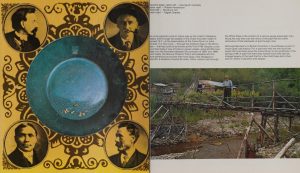The Wainwright star (1921-09-07)
Date: September 7, 1921

University of Alberta Library‘s digitized collections represent unique and distinctive materials identified for digitization and inclusion in our collections for their research, teaching, and learning value. Selection is guided by our digitization strategy. Please see our website for more information on the Copyright and Terms of Use of our digital collections. The majority of items in these collections have been digitized from items housed in the University of Alberta or the University of Alberta Archives, and their physical locations can be found by searching either the Library or the Archives catalogue.
Some items have been borrowed for digitization from collaborating institutions or may have been born digital. When possible, we’ve included the person or organization that provided the physical or digital media under the contributor metadata field. The University of Alberta (U of A) is a public research university in Edmonton, Alberta, Canada. Founded in 1908 by Alexander Cameron Rutherford, the first premier of Alberta, and Henry Marshall Tory, its first president, it is widely recognized as one of the best universities in Canada. The main campus covers 50 city blocks and has over 90 buildings directly across the North Saskatchewan River from downtown Edmonton. The University of Alberta library system received a tremendous boost with the opening of the Rutherford Library in May 1951 and now has one of Canada’s largest research library systems. As of 2004, according to the Association of Research Libraries, the library system is the second-largest by the number of volumes held, among all Canadian universities after the University of Toronto Library. A statement on catalogue and resource descriptions: The University of Alberta Library recognizes that our catalogue and resource descriptions contain language that reflects the biases, norms, and perspectives of the time in which they were created. In particular, for resources about persons and groups, this language is often outdated and harmful. These descriptions also incorporate controlled vocabularies, such as the Library of Congress Subject Headings, which include some headings (e.g., Indians of North America), that are offensive or inappropriate. We use international standards for description, but support and actively participate in efforts to update and change these practices as we strive for descriptions that are inclusive, respectful, and do not cause harm. We acknowledge the critical importance of community consultation in these efforts, and as residents on Treaty 6 territory and Métis Region 4, we commit to working together with our local communities to make these changes. For more information about our Internet Archive collections, please contact [email protected].
Date: September 7, 1921
Date: September 12, 1929
Date: January 25, 1923
Date: June 30, 1921
Date: June 3, 1926
Date: September 20, 1923
Date: December 9, 1937
Date: December 24, 1919
Date: May 11, 1921
Date: August 13, 1925
Showing 1-12 of 2080 results